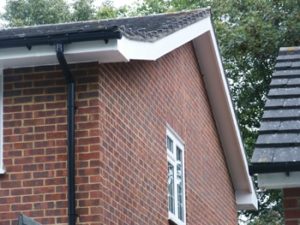What Freud Can Teach Us About Soffit Replacement
페이지 정보

본문
Affordable Soffit Replacement: A Comprehensive Guide
Soffits are a necessary part of any home's outside structure, playing a pivotal role in preserving the roofing system's stability and offering a finished appearance to eaves. Over time, soffits can end up being harmed due to wear, rot, or bug infestation. While soffit replacement may appear like a difficult and expensive undertaking, this guide will assist property owners comprehend the procedure and explore affordable alternatives for soffit replacement.

What is Soffit and Why is it Important?
Soffits are the horizontal surface that links the outside walls of a home to the underside of the roofing's overhang. They are not just aesthetic elements however serve key practical functions, including:
- Ventilation: Soffits offer airflow into the attic, assisting to control temperature and prevent moisture accumulation.
- Protection: They protect rafters from the elements, avoiding water damage and decay.
- Bug Deterrence: Well-installed soffits can prevent pests and other little animals from nesting in the eaves.
Signs You Need Soffit Replacement
House owners ought to always watch for signs of soffit damage, which can indicate the need for replacement:
- Visible Rot or Decay: Look for indications of wood rot or decay around the edges of your soffit.
- Insect Infestations: Finding bugs or nesting materials can suggest a jeopardized soffit.
- Staining or Staining: Water discolorations typically indicate underlying leaks or damage that needs attention.
- Peeling or Cracking Paint: Flaking paint can indicate moisture issues or wood damage.
- Drooping Sections: If the soffit appears to sag, it may be failing structurally.
How to Approach Soffit Replacement Affordably
Affordable soffit replacement doesn't mean compromising on quality. Homeowners can think about the following strategies:
1. Assess Your Current Soffits
Before continuing with replacement, evaluate whether an easy repair could extend the lifespan of existing soffits. Small damages such as small holes or surface area rot can frequently be resolved without total replacement.
2. Material Selection
Picking the ideal product can significantly impact expenses. Traditional wood soffits are typically the most pricey due to labor and material costs. On the other hand, alternatives such as vinyl or aluminum can be resilient and more cost-efficient.
| Product Type | Cost per Square Foot | Pros | Cons |
|---|---|---|---|
| Wood | ₤ 3 - ₤ 6 | Aesthetic appeal | Prone to rot |
| Vinyl | ₤ 2 - ₤ 4 | Low maintenance | Fading with time |
| Aluminum | ₤ 2 - ₤ 4 | Rust-resistant | Dents easily |
| Fiber Cement | ₤ 3 - ₤ 5 | Sturdiness | Heavy to set up |
3. DIY vs. Hiring Professionals
Deciding whether to take on the project as a DIY or hire specialists can considerably affect the budget plan:
- DIY Installation: This can save a significant amount in labor costs. Nevertheless, it needs tools, time, and a fundamental knowledge of construction.
- Hiring a Contractor: Professional installation makes sure a quality finish but can result in greater total costs. To keep costs down, get several quotes and discuss materials that fit your spending plan.
4. Timing the Project
Timing can influence pricing. Contractors typically have slower seasons where they may provide discount rates. Scheduling your soffit replacement during less busy times can yield cost savings.
5. Explore Local Programs and Grants
Home enhancement grants or loans may be available through local federal government programs targeted at assisting with energy efficiency jobs. Research readily available options in your area before starting your task.
Steps for Soffit Replacement
If the decision is made to replace soffits, here is a general summary of the steps involved:
- Gather Necessary Tools and Materials: Ensure you have ladders, saws, nails, caulk, and the picked soffit product.
- Remove Old Soffits: Carefully detach old soffits, taking care to avoid damage to surrounding structures.
- Inspect Framework: Look for any signs of decay or damage in the structure below. Make repairs as required.
- Procedure and Cut New Soffits: Measure the location accurately and cut brand-new pieces to size.
- Set Up New Soffits: Secure the new soffit panels in location, guaranteeing they are aligned and correctly ventilated where necessary.
- Paint (if appropriate): If using wood or fiber cement, consider using a weatherproof sealant or paint for added security.
Regularly Asked Questions (FAQs)
1. How typically should soffits be changed?
Soffits can last in between 20-30 years depending on material and ecological exposure. Regular assessments can assist recognize the requirement for replacement.
2. Can I replace soffits without removing the rain gutters?
Yes, soffit replacement can often be done without removing seamless gutters if sufficient care is taken. Nevertheless, it's best to consult with a professional for complicated scenarios.
3. What are the expense differences between products?
Wood is generally the most costly, while vinyl and aluminum are more budget-friendly options. Fiber cement falls in between.
4. Is soffit replacement a DIY job?
While possible as a DIY job, it's important to have the right tools and skills. Assessment with professionals is advised for a best surface.
5. How can I preserve new soffits?
Regular cleaning and inspections for indications of damage can help extend the life of recently replaced soffits, despite product type.
Affordable soffit replacement is achievable through notified decisions about materials, careful preparation, and an evaluation of whether to DIY or employ a professional. By understanding the indications of damage, evaluating material options, and following a methodical replacement procedure, property owners can safeguard their investments and guarantee their homes stay both practical and visually appealing.
- 이전글롤 비제이 솔랭 【룰라보증.com / 가입코드 9000】 룰라벳 25.06.29
- 다음글【대전룸보도】☎O1O√2062√3474 k톡RYBOY3500★대전룸알바★대전룸보도 대전노래방알바 대전보도사무실 대전노래방보도 25.06.29
댓글목록
등록된 댓글이 없습니다.